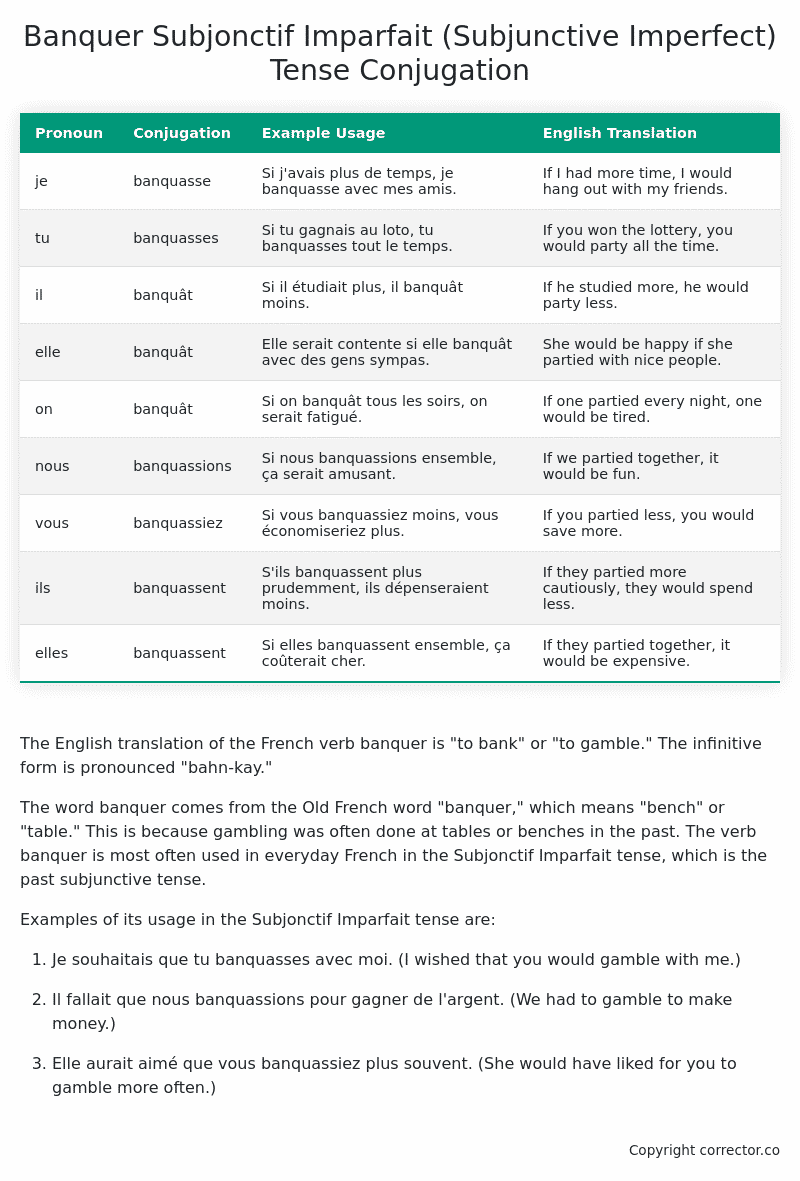Subjonctif Imparfait (Subjunctive Imperfect) Tense Conjugation of the French Verb banquer
Introduction to the verb banquer
The English translation of the French verb banquer is “to bank” or “to gamble.” The infinitive form is pronounced “bahn-kay.”
The word banquer comes from the Old French word “banquer,” which means “bench” or “table.” This is because gambling was often done at tables or benches in the past. The verb banquer is most often used in everyday French in the Subjonctif Imparfait tense, which is the past subjunctive tense.
Examples of its usage in the Subjonctif Imparfait tense are:
-
Je souhaitais que tu banquasses avec moi.
(I wished that you would gamble with me.) -
Il fallait que nous banquassions pour gagner de l’argent.
(We had to gamble to make money.) -
Elle aurait aimé que vous banquassiez plus souvent.
(She would have liked for you to gamble more often.)
Table of the Subjonctif Imparfait (Subjunctive Imperfect) Tense Conjugation of banquer
| Pronoun | Conjugation | Example Usage | English Translation |
|---|---|---|---|
| je | banquasse | Si j’avais plus de temps, je banquasse avec mes amis. | If I had more time, I would hang out with my friends. |
| tu | banquasses | Si tu gagnais au loto, tu banquasses tout le temps. | If you won the lottery, you would party all the time. |
| il | banquât | Si il étudiait plus, il banquât moins. | If he studied more, he would party less. |
| elle | banquât | Elle serait contente si elle banquât avec des gens sympas. | She would be happy if she partied with nice people. |
| on | banquât | Si on banquât tous les soirs, on serait fatigué. | If one partied every night, one would be tired. |
| nous | banquassions | Si nous banquassions ensemble, ça serait amusant. | If we partied together, it would be fun. |
| vous | banquassiez | Si vous banquassiez moins, vous économiseriez plus. | If you partied less, you would save more. |
| ils | banquassent | S’ils banquassent plus prudemment, ils dépenseraient moins. | If they partied more cautiously, they would spend less. |
| elles | banquassent | Si elles banquassent ensemble, ça coûterait cher. | If they partied together, it would be expensive. |
Other Conjugations for Banquer.
Le Present (Present Tense) Conjugation of the French Verb banquer
Imparfait (Imperfect) Tense Conjugation of the French Verb banquer
Passé Simple (Simple Past) Tense Conjugation of the French Verb banquer
Passé Composé (Present Perfect) Tense Conjugation of the French Verb banquer
Futur Simple (Simple Future) Tense Conjugation of the French Verb banquer
Futur Proche (Near Future) Tense Conjugation of the French Verb banquer
Plus-que-parfait (Pluperfect) Tense Conjugation of the French Verb banquer
Passé Antérieur (Past Anterior) Tense Conjugation of the French Verb banquer
Futur Antérieur (Future Anterior) Tense Conjugation of the French Verb banquer
Subjonctif Présent (Subjunctive Present) Tense Conjugation of the French Verb banquer
Subjonctif Passé (Subjunctive Past) Tense Conjugation of the French Verb banquer
Subjonctif Imparfait (Subjunctive Imperfect) Tense Conjugation of the French Verb banquer (this article)
Subjonctif Plus-que-parfait (Subjunctive Pluperfect) Tense Conjugation of the French Verb banquer
Conditionnel Présent (Conditional Present) Tense Conjugation of the French Verb banquer
Conditionnel Passé (Conditional Past) Tense Conjugation of the French Verb banquer
L’impératif Présent (Imperative Present) Tense Conjugation of the French Verb banquer
L’infinitif Présent (Infinitive Present) Tense Conjugation of the French Verb banquer
Struggling with French verbs or the language in general? Why not use our free French Grammar Checker – no registration required!
Get a FREE Download Study Sheet of this Conjugation 🔥
Simply right click the image below, click “save image” and get your free reference for the banquer Subjonctif Imparfait tense conjugation!

Banquer – About the French Subjonctif Imparfait (Subjunctive Imperfect) Tense
Formation
Common Everyday Usage Patterns
Interactions with Other Tenses
Subjonctif Présent
Indicatif Passé Composé
Conditional
Conditional Perfect
Summary
I hope you enjoyed this article on the verb banquer. Still in a learning mood? Check out another TOTALLY random French verb conjugation!


